Improving Cultural Competence in Nursing
VerifiedAdded on 2020/10/05
|16
|2708
|465
AI Summary
This assignment focuses on the significance of cultural competence in nursing practice. It delves into the experiences of registered nurses in Saudi Arabia, factors influencing cultural competency among nursing students, and guidelines for implementing culturally competent nursing care. The discussion also touches upon culture change and its effect on nursing home quality of care, as well as the impact of international service-learning on nursing students' cultural competency. Furthermore, it examines cultural competency models and assessment instruments used in nursing, highlighting the need for interventions to improve cultural competency in healthcare.
Contribute Materials
Your contribution can guide someone’s learning journey. Share your
documents today.
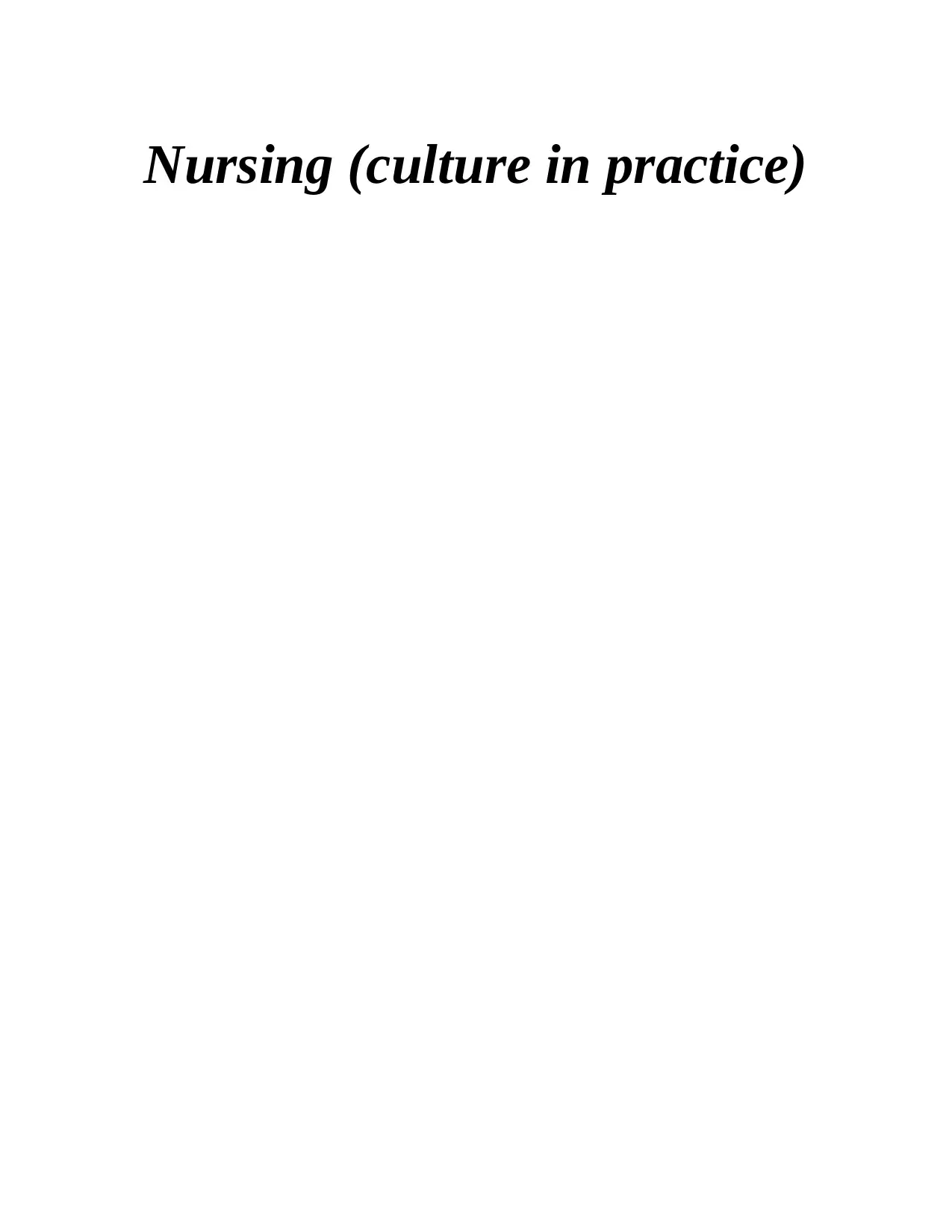
Nursing (culture in practice)
Secure Best Marks with AI Grader
Need help grading? Try our AI Grader for instant feedback on your assignments.
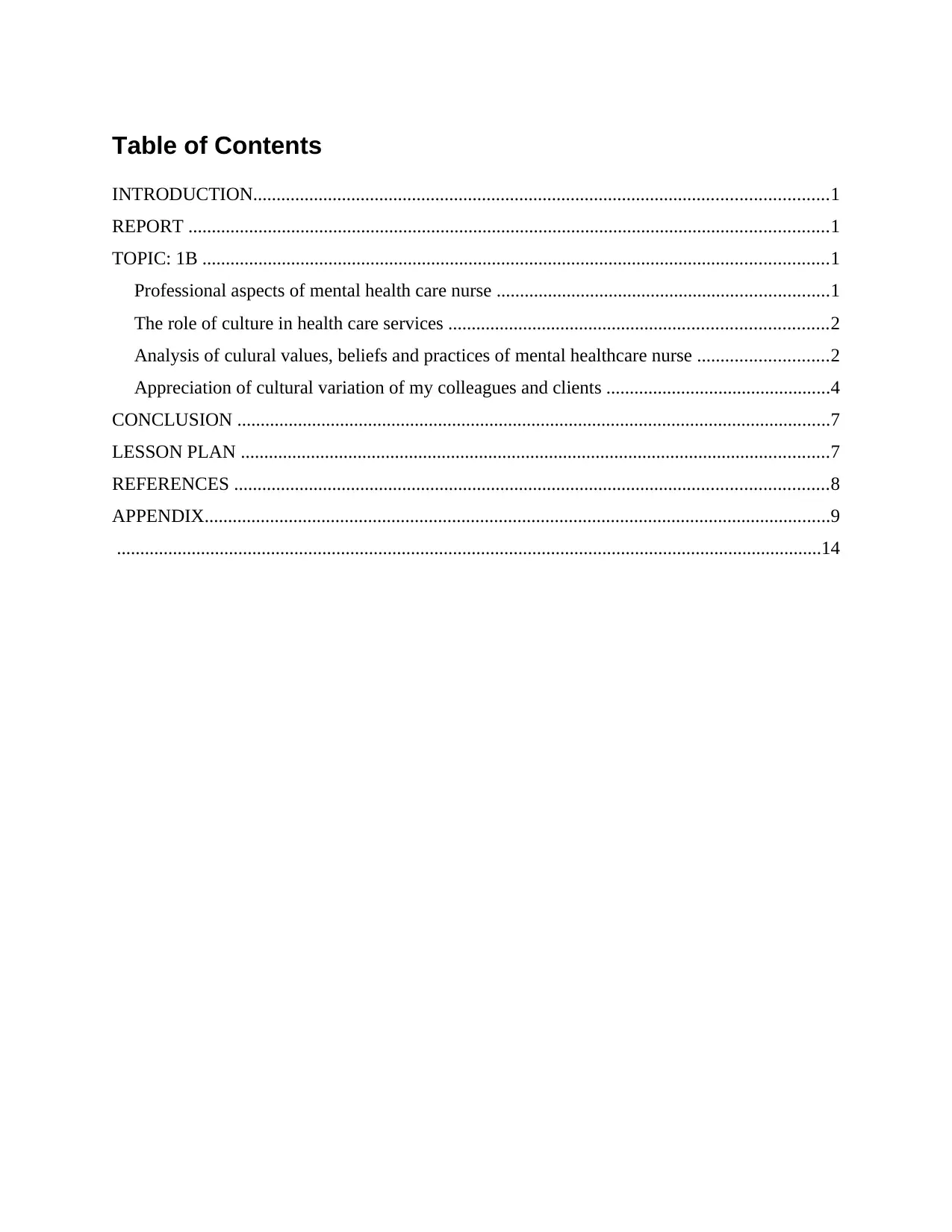
Table of Contents
INTRODUCTION...........................................................................................................................1
REPORT .........................................................................................................................................1
TOPIC: 1B ......................................................................................................................................1
Professional aspects of mental health care nurse .......................................................................1
The role of culture in health care services .................................................................................2
Analysis of culural values, beliefs and practices of mental healthcare nurse ............................2
Appreciation of cultural variation of my colleagues and clients ................................................4
CONCLUSION ...............................................................................................................................7
LESSON PLAN ..............................................................................................................................7
REFERENCES ...............................................................................................................................8
APPENDIX......................................................................................................................................9
.......................................................................................................................................................14
INTRODUCTION...........................................................................................................................1
REPORT .........................................................................................................................................1
TOPIC: 1B ......................................................................................................................................1
Professional aspects of mental health care nurse .......................................................................1
The role of culture in health care services .................................................................................2
Analysis of culural values, beliefs and practices of mental healthcare nurse ............................2
Appreciation of cultural variation of my colleagues and clients ................................................4
CONCLUSION ...............................................................................................................................7
LESSON PLAN ..............................................................................................................................7
REFERENCES ...............................................................................................................................8
APPENDIX......................................................................................................................................9
.......................................................................................................................................................14
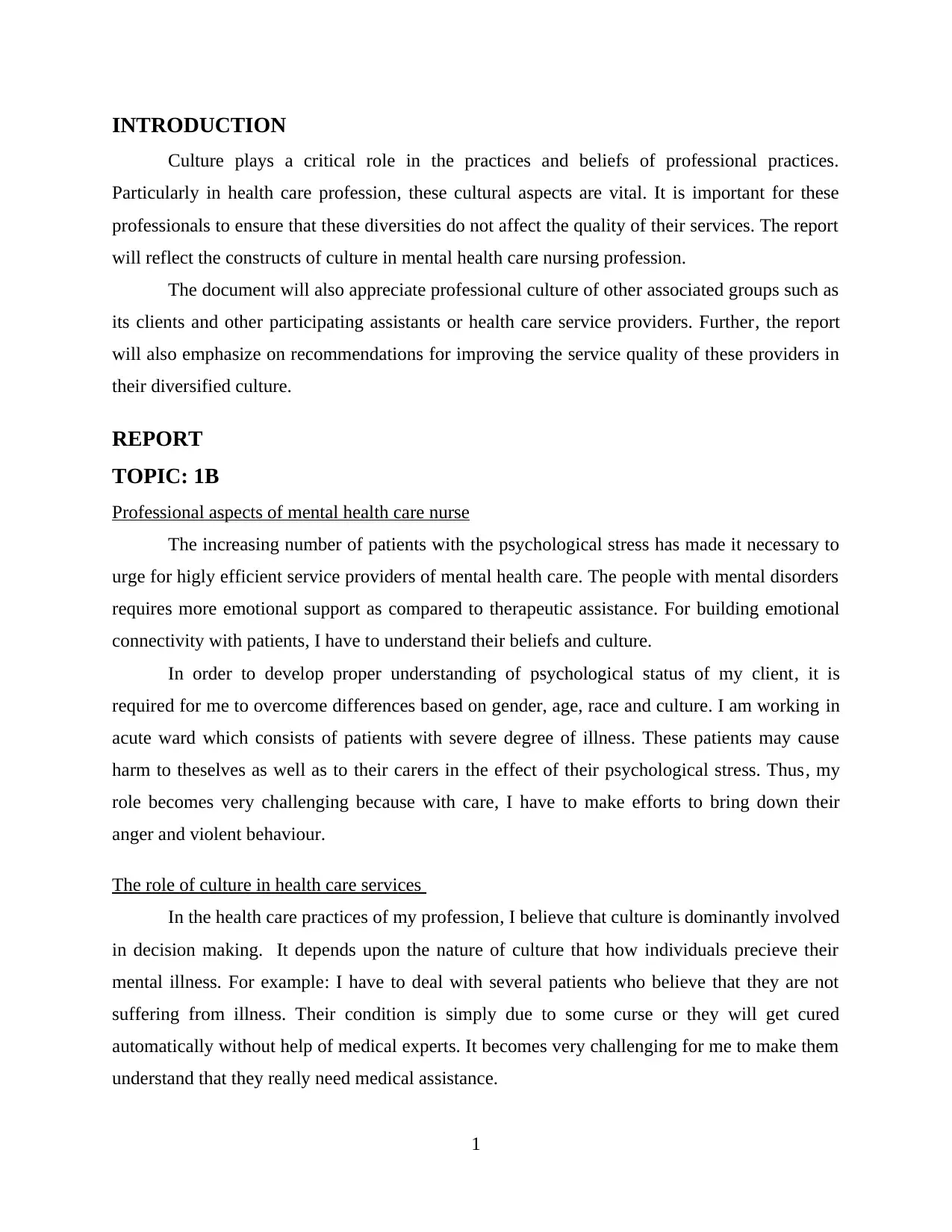
INTRODUCTION
Culture plays a critical role in the practices and beliefs of professional practices.
Particularly in health care profession, these cultural aspects are vital. It is important for these
professionals to ensure that these diversities do not affect the quality of their services. The report
will reflect the constructs of culture in mental health care nursing profession.
The document will also appreciate professional culture of other associated groups such as
its clients and other participating assistants or health care service providers. Further, the report
will also emphasize on recommendations for improving the service quality of these providers in
their diversified culture.
REPORT
TOPIC: 1B
Professional aspects of mental health care nurse
The increasing number of patients with the psychological stress has made it necessary to
urge for higly efficient service providers of mental health care. The people with mental disorders
requires more emotional support as compared to therapeutic assistance. For building emotional
connectivity with patients, I have to understand their beliefs and culture.
In order to develop proper understanding of psychological status of my client, it is
required for me to overcome differences based on gender, age, race and culture. I am working in
acute ward which consists of patients with severe degree of illness. These patients may cause
harm to theselves as well as to their carers in the effect of their psychological stress. Thus, my
role becomes very challenging because with care, I have to make efforts to bring down their
anger and violent behaviour.
The role of culture in health care services
In the health care practices of my profession, I believe that culture is dominantly involved
in decision making. It depends upon the nature of culture that how individuals precieve their
mental illness. For example: I have to deal with several patients who believe that they are not
suffering from illness. Their condition is simply due to some curse or they will get cured
automatically without help of medical experts. It becomes very challenging for me to make them
understand that they really need medical assistance.
1
Culture plays a critical role in the practices and beliefs of professional practices.
Particularly in health care profession, these cultural aspects are vital. It is important for these
professionals to ensure that these diversities do not affect the quality of their services. The report
will reflect the constructs of culture in mental health care nursing profession.
The document will also appreciate professional culture of other associated groups such as
its clients and other participating assistants or health care service providers. Further, the report
will also emphasize on recommendations for improving the service quality of these providers in
their diversified culture.
REPORT
TOPIC: 1B
Professional aspects of mental health care nurse
The increasing number of patients with the psychological stress has made it necessary to
urge for higly efficient service providers of mental health care. The people with mental disorders
requires more emotional support as compared to therapeutic assistance. For building emotional
connectivity with patients, I have to understand their beliefs and culture.
In order to develop proper understanding of psychological status of my client, it is
required for me to overcome differences based on gender, age, race and culture. I am working in
acute ward which consists of patients with severe degree of illness. These patients may cause
harm to theselves as well as to their carers in the effect of their psychological stress. Thus, my
role becomes very challenging because with care, I have to make efforts to bring down their
anger and violent behaviour.
The role of culture in health care services
In the health care practices of my profession, I believe that culture is dominantly involved
in decision making. It depends upon the nature of culture that how individuals precieve their
mental illness. For example: I have to deal with several patients who believe that they are not
suffering from illness. Their condition is simply due to some curse or they will get cured
automatically without help of medical experts. It becomes very challenging for me to make them
understand that they really need medical assistance.
1
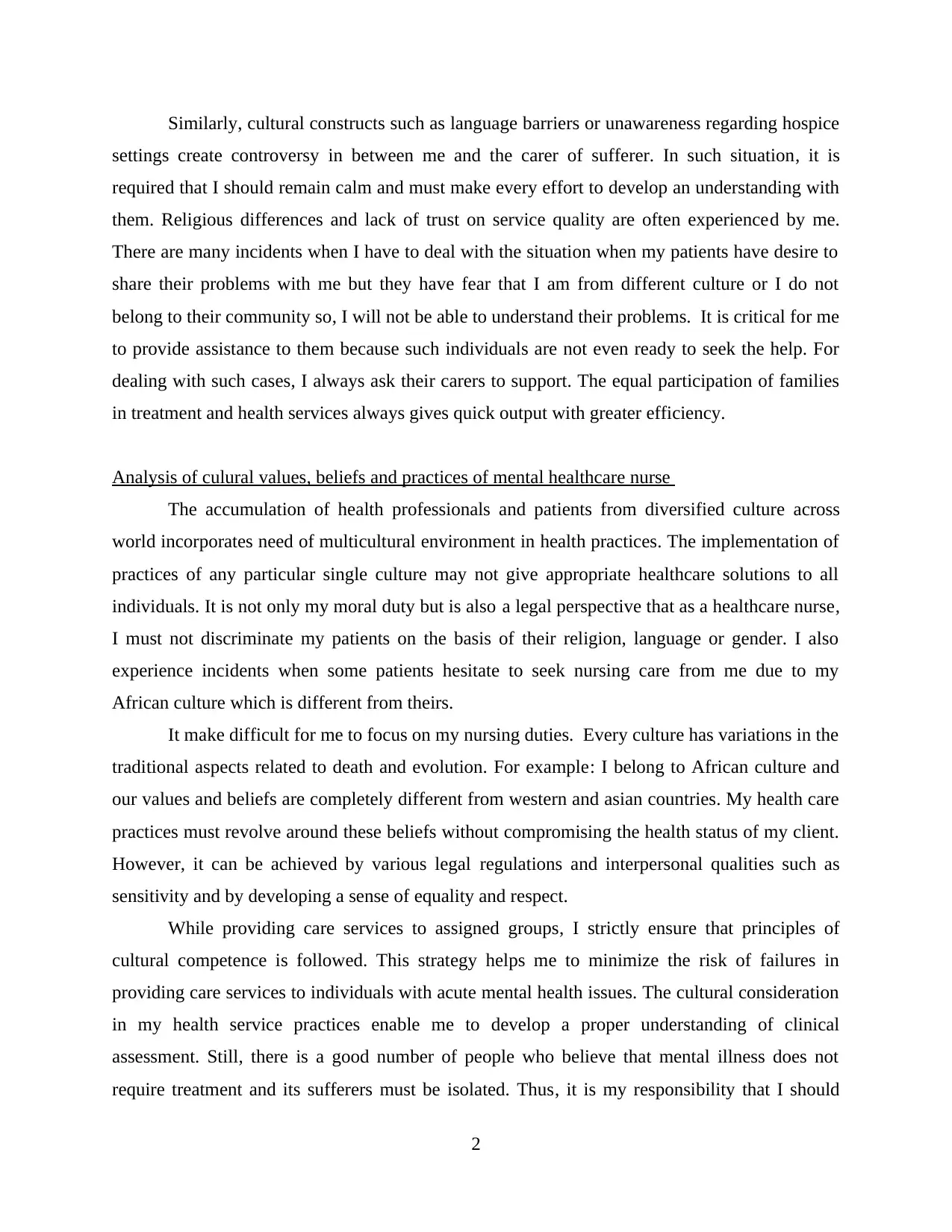
Similarly, cultural constructs such as language barriers or unawareness regarding hospice
settings create controversy in between me and the carer of sufferer. In such situation, it is
required that I should remain calm and must make every effort to develop an understanding with
them. Religious differences and lack of trust on service quality are often experienced by me.
There are many incidents when I have to deal with the situation when my patients have desire to
share their problems with me but they have fear that I am from different culture or I do not
belong to their community so, I will not be able to understand their problems. It is critical for me
to provide assistance to them because such individuals are not even ready to seek the help. For
dealing with such cases, I always ask their carers to support. The equal participation of families
in treatment and health services always gives quick output with greater efficiency.
Analysis of culural values, beliefs and practices of mental healthcare nurse
The accumulation of health professionals and patients from diversified culture across
world incorporates need of multicultural environment in health practices. The implementation of
practices of any particular single culture may not give appropriate healthcare solutions to all
individuals. It is not only my moral duty but is also a legal perspective that as a healthcare nurse,
I must not discriminate my patients on the basis of their religion, language or gender. I also
experience incidents when some patients hesitate to seek nursing care from me due to my
African culture which is different from theirs.
It make difficult for me to focus on my nursing duties. Every culture has variations in the
traditional aspects related to death and evolution. For example: I belong to African culture and
our values and beliefs are completely different from western and asian countries. My health care
practices must revolve around these beliefs without compromising the health status of my client.
However, it can be achieved by various legal regulations and interpersonal qualities such as
sensitivity and by developing a sense of equality and respect.
While providing care services to assigned groups, I strictly ensure that principles of
cultural competence is followed. This strategy helps me to minimize the risk of failures in
providing care services to individuals with acute mental health issues. The cultural consideration
in my health service practices enable me to develop a proper understanding of clinical
assessment. Still, there is a good number of people who believe that mental illness does not
require treatment and its sufferers must be isolated. Thus, it is my responsibility that I should
2
settings create controversy in between me and the carer of sufferer. In such situation, it is
required that I should remain calm and must make every effort to develop an understanding with
them. Religious differences and lack of trust on service quality are often experienced by me.
There are many incidents when I have to deal with the situation when my patients have desire to
share their problems with me but they have fear that I am from different culture or I do not
belong to their community so, I will not be able to understand their problems. It is critical for me
to provide assistance to them because such individuals are not even ready to seek the help. For
dealing with such cases, I always ask their carers to support. The equal participation of families
in treatment and health services always gives quick output with greater efficiency.
Analysis of culural values, beliefs and practices of mental healthcare nurse
The accumulation of health professionals and patients from diversified culture across
world incorporates need of multicultural environment in health practices. The implementation of
practices of any particular single culture may not give appropriate healthcare solutions to all
individuals. It is not only my moral duty but is also a legal perspective that as a healthcare nurse,
I must not discriminate my patients on the basis of their religion, language or gender. I also
experience incidents when some patients hesitate to seek nursing care from me due to my
African culture which is different from theirs.
It make difficult for me to focus on my nursing duties. Every culture has variations in the
traditional aspects related to death and evolution. For example: I belong to African culture and
our values and beliefs are completely different from western and asian countries. My health care
practices must revolve around these beliefs without compromising the health status of my client.
However, it can be achieved by various legal regulations and interpersonal qualities such as
sensitivity and by developing a sense of equality and respect.
While providing care services to assigned groups, I strictly ensure that principles of
cultural competence is followed. This strategy helps me to minimize the risk of failures in
providing care services to individuals with acute mental health issues. The cultural consideration
in my health service practices enable me to develop a proper understanding of clinical
assessment. Still, there is a good number of people who believe that mental illness does not
require treatment and its sufferers must be isolated. Thus, it is my responsibility that I should
2
Paraphrase This Document
Need a fresh take? Get an instant paraphrase of this document with our AI Paraphraser
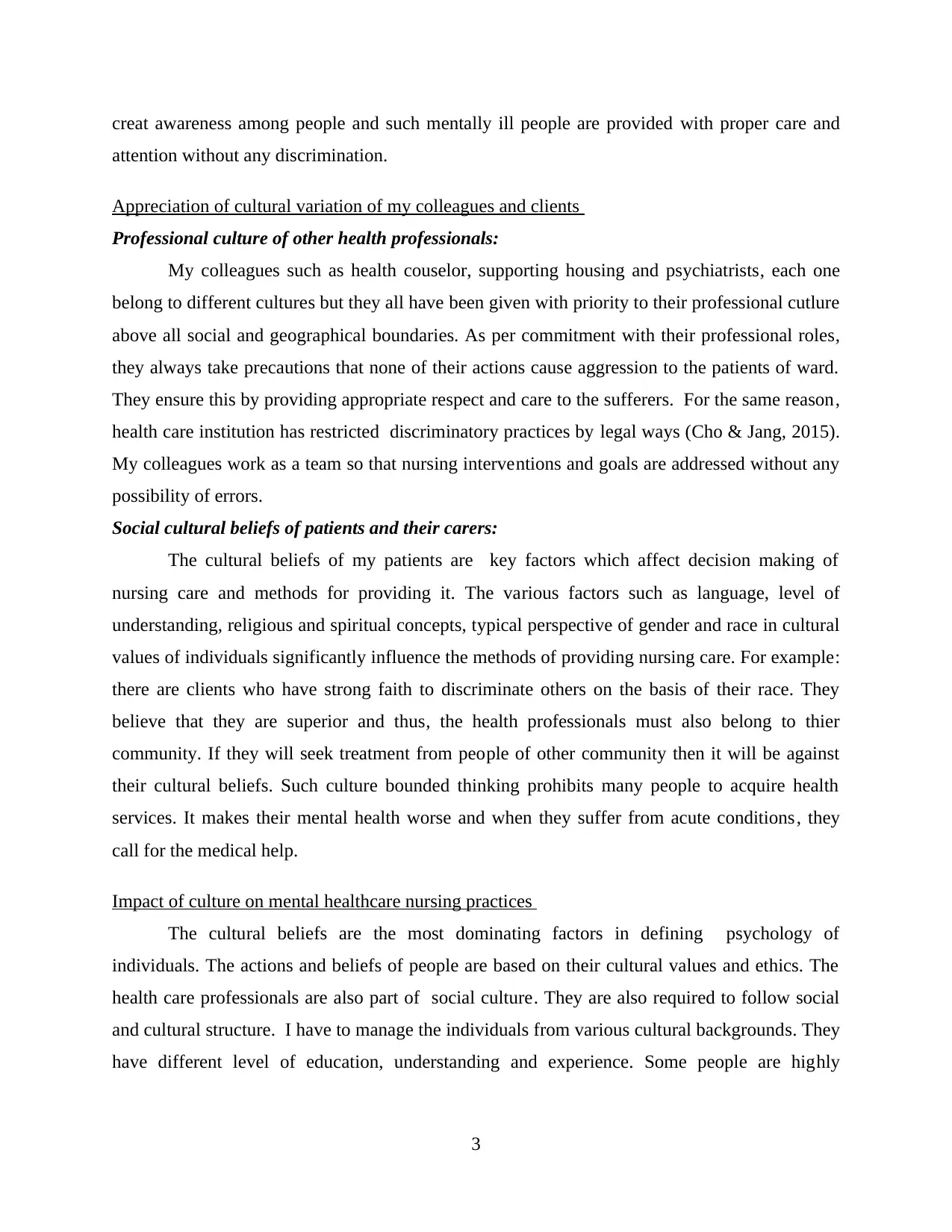
creat awareness among people and such mentally ill people are provided with proper care and
attention without any discrimination.
Appreciation of cultural variation of my colleagues and clients
Professional culture of other health professionals:
My colleagues such as health couselor, supporting housing and psychiatrists, each one
belong to different cultures but they all have been given with priority to their professional cutlure
above all social and geographical boundaries. As per commitment with their professional roles,
they always take precautions that none of their actions cause aggression to the patients of ward.
They ensure this by providing appropriate respect and care to the sufferers. For the same reason,
health care institution has restricted discriminatory practices by legal ways (Cho & Jang, 2015).
My colleagues work as a team so that nursing interventions and goals are addressed without any
possibility of errors.
Social cultural beliefs of patients and their carers:
The cultural beliefs of my patients are key factors which affect decision making of
nursing care and methods for providing it. The various factors such as language, level of
understanding, religious and spiritual concepts, typical perspective of gender and race in cultural
values of individuals significantly influence the methods of providing nursing care. For example:
there are clients who have strong faith to discriminate others on the basis of their race. They
believe that they are superior and thus, the health professionals must also belong to thier
community. If they will seek treatment from people of other community then it will be against
their cultural beliefs. Such culture bounded thinking prohibits many people to acquire health
services. It makes their mental health worse and when they suffer from acute conditions, they
call for the medical help.
Impact of culture on mental healthcare nursing practices
The cultural beliefs are the most dominating factors in defining psychology of
individuals. The actions and beliefs of people are based on their cultural values and ethics. The
health care professionals are also part of social culture. They are also required to follow social
and cultural structure. I have to manage the individuals from various cultural backgrounds. They
have different level of education, understanding and experience. Some people are highly
3
attention without any discrimination.
Appreciation of cultural variation of my colleagues and clients
Professional culture of other health professionals:
My colleagues such as health couselor, supporting housing and psychiatrists, each one
belong to different cultures but they all have been given with priority to their professional cutlure
above all social and geographical boundaries. As per commitment with their professional roles,
they always take precautions that none of their actions cause aggression to the patients of ward.
They ensure this by providing appropriate respect and care to the sufferers. For the same reason,
health care institution has restricted discriminatory practices by legal ways (Cho & Jang, 2015).
My colleagues work as a team so that nursing interventions and goals are addressed without any
possibility of errors.
Social cultural beliefs of patients and their carers:
The cultural beliefs of my patients are key factors which affect decision making of
nursing care and methods for providing it. The various factors such as language, level of
understanding, religious and spiritual concepts, typical perspective of gender and race in cultural
values of individuals significantly influence the methods of providing nursing care. For example:
there are clients who have strong faith to discriminate others on the basis of their race. They
believe that they are superior and thus, the health professionals must also belong to thier
community. If they will seek treatment from people of other community then it will be against
their cultural beliefs. Such culture bounded thinking prohibits many people to acquire health
services. It makes their mental health worse and when they suffer from acute conditions, they
call for the medical help.
Impact of culture on mental healthcare nursing practices
The cultural beliefs are the most dominating factors in defining psychology of
individuals. The actions and beliefs of people are based on their cultural values and ethics. The
health care professionals are also part of social culture. They are also required to follow social
and cultural structure. I have to manage the individuals from various cultural backgrounds. They
have different level of education, understanding and experience. Some people are highly
3
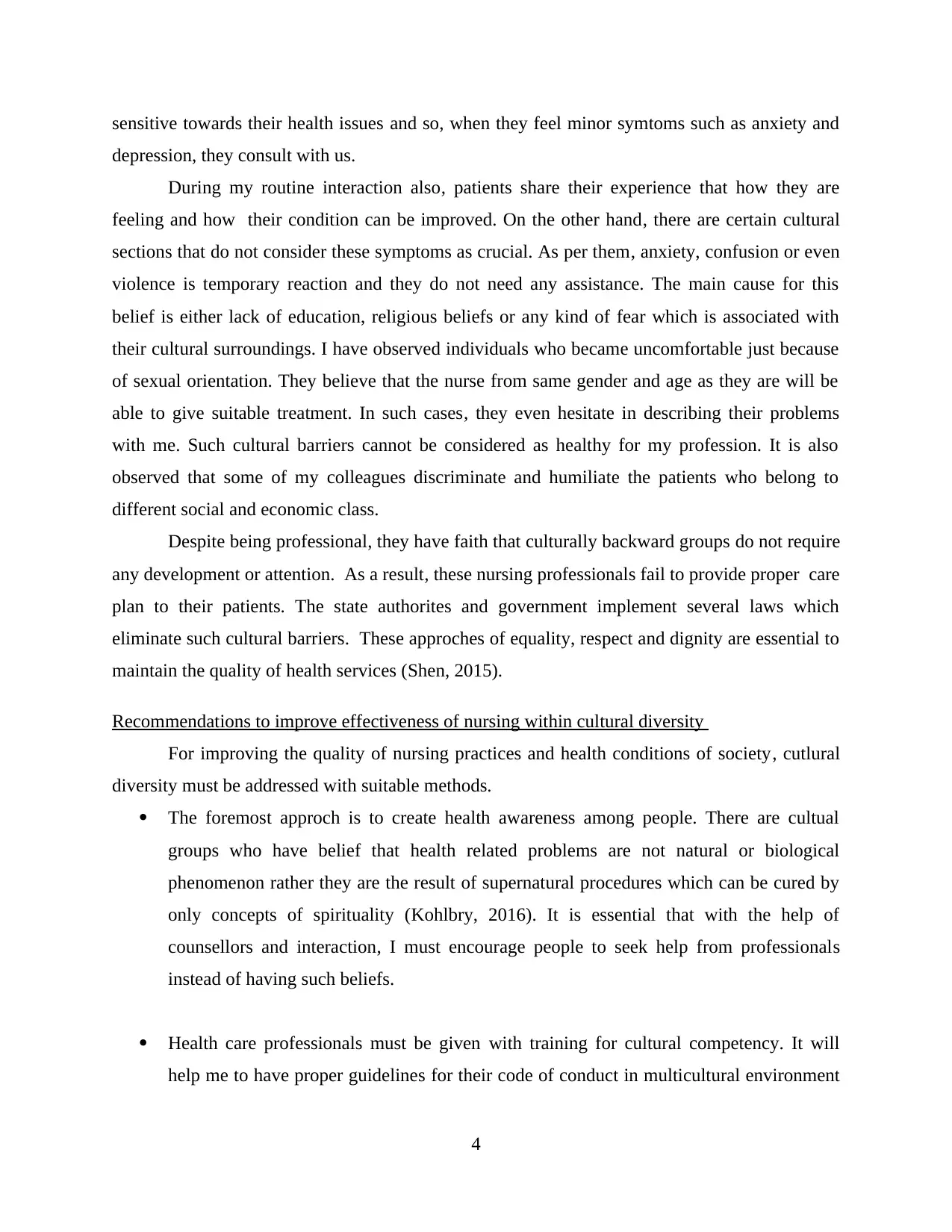
sensitive towards their health issues and so, when they feel minor symtoms such as anxiety and
depression, they consult with us.
During my routine interaction also, patients share their experience that how they are
feeling and how their condition can be improved. On the other hand, there are certain cultural
sections that do not consider these symptoms as crucial. As per them, anxiety, confusion or even
violence is temporary reaction and they do not need any assistance. The main cause for this
belief is either lack of education, religious beliefs or any kind of fear which is associated with
their cultural surroundings. I have observed individuals who became uncomfortable just because
of sexual orientation. They believe that the nurse from same gender and age as they are will be
able to give suitable treatment. In such cases, they even hesitate in describing their problems
with me. Such cultural barriers cannot be considered as healthy for my profession. It is also
observed that some of my colleagues discriminate and humiliate the patients who belong to
different social and economic class.
Despite being professional, they have faith that culturally backward groups do not require
any development or attention. As a result, these nursing professionals fail to provide proper care
plan to their patients. The state authorites and government implement several laws which
eliminate such cultural barriers. These approches of equality, respect and dignity are essential to
maintain the quality of health services (Shen, 2015).
Recommendations to improve effectiveness of nursing within cultural diversity
For improving the quality of nursing practices and health conditions of society, cutlural
diversity must be addressed with suitable methods.
The foremost approch is to create health awareness among people. There are cultual
groups who have belief that health related problems are not natural or biological
phenomenon rather they are the result of supernatural procedures which can be cured by
only concepts of spirituality (Kohlbry, 2016). It is essential that with the help of
counsellors and interaction, I must encourage people to seek help from professionals
instead of having such beliefs.
Health care professionals must be given with training for cultural competency. It will
help me to have proper guidelines for their code of conduct in multicultural environment
4
depression, they consult with us.
During my routine interaction also, patients share their experience that how they are
feeling and how their condition can be improved. On the other hand, there are certain cultural
sections that do not consider these symptoms as crucial. As per them, anxiety, confusion or even
violence is temporary reaction and they do not need any assistance. The main cause for this
belief is either lack of education, religious beliefs or any kind of fear which is associated with
their cultural surroundings. I have observed individuals who became uncomfortable just because
of sexual orientation. They believe that the nurse from same gender and age as they are will be
able to give suitable treatment. In such cases, they even hesitate in describing their problems
with me. Such cultural barriers cannot be considered as healthy for my profession. It is also
observed that some of my colleagues discriminate and humiliate the patients who belong to
different social and economic class.
Despite being professional, they have faith that culturally backward groups do not require
any development or attention. As a result, these nursing professionals fail to provide proper care
plan to their patients. The state authorites and government implement several laws which
eliminate such cultural barriers. These approches of equality, respect and dignity are essential to
maintain the quality of health services (Shen, 2015).
Recommendations to improve effectiveness of nursing within cultural diversity
For improving the quality of nursing practices and health conditions of society, cutlural
diversity must be addressed with suitable methods.
The foremost approch is to create health awareness among people. There are cultual
groups who have belief that health related problems are not natural or biological
phenomenon rather they are the result of supernatural procedures which can be cured by
only concepts of spirituality (Kohlbry, 2016). It is essential that with the help of
counsellors and interaction, I must encourage people to seek help from professionals
instead of having such beliefs.
Health care professionals must be given with training for cultural competency. It will
help me to have proper guidelines for their code of conduct in multicultural environment
4
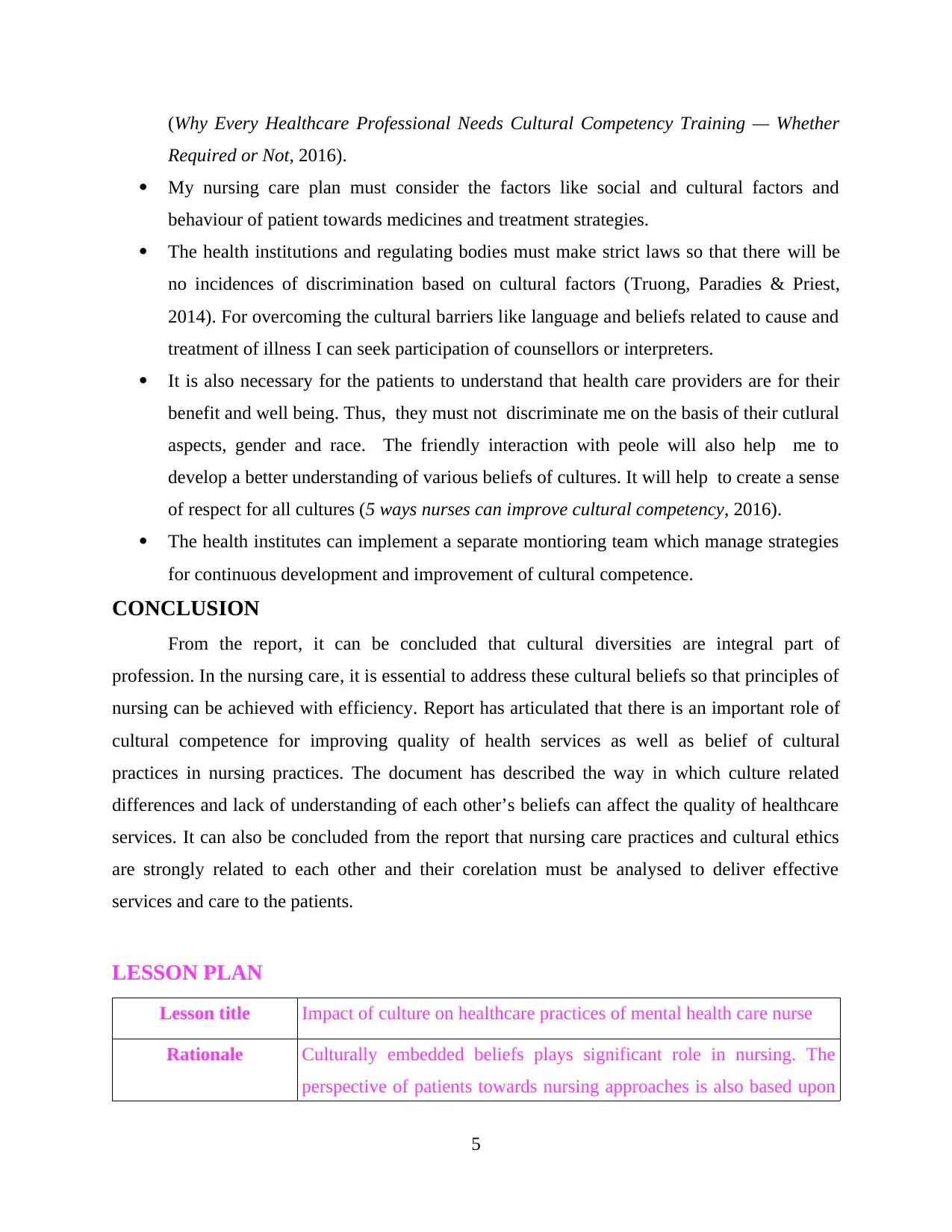
(Why Every Healthcare Professional Needs Cultural Competency Training — Whether
Required or Not, 2016).
My nursing care plan must consider the factors like social and cultural factors and
behaviour of patient towards medicines and treatment strategies.
The health institutions and regulating bodies must make strict laws so that there will be
no incidences of discrimination based on cultural factors (Truong, Paradies & Priest,
2014). For overcoming the cultural barriers like language and beliefs related to cause and
treatment of illness I can seek participation of counsellors or interpreters.
It is also necessary for the patients to understand that health care providers are for their
benefit and well being. Thus, they must not discriminate me on the basis of their cutlural
aspects, gender and race. The friendly interaction with peole will also help me to
develop a better understanding of various beliefs of cultures. It will help to create a sense
of respect for all cultures (5 ways nurses can improve cultural competency, 2016).
The health institutes can implement a separate montioring team which manage strategies
for continuous development and improvement of cultural competence.
CONCLUSION
From the report, it can be concluded that cultural diversities are integral part of
profession. In the nursing care, it is essential to address these cultural beliefs so that principles of
nursing can be achieved with efficiency. Report has articulated that there is an important role of
cultural competence for improving quality of health services as well as belief of cultural
practices in nursing practices. The document has described the way in which culture related
differences and lack of understanding of each other’s beliefs can affect the quality of healthcare
services. It can also be concluded from the report that nursing care practices and cultural ethics
are strongly related to each other and their corelation must be analysed to deliver effective
services and care to the patients.
LESSON PLAN
Lesson title Impact of culture on healthcare practices of mental health care nurse
Rationale Culturally embedded beliefs plays significant role in nursing. The
perspective of patients towards nursing approaches is also based upon
5
Required or Not, 2016).
My nursing care plan must consider the factors like social and cultural factors and
behaviour of patient towards medicines and treatment strategies.
The health institutions and regulating bodies must make strict laws so that there will be
no incidences of discrimination based on cultural factors (Truong, Paradies & Priest,
2014). For overcoming the cultural barriers like language and beliefs related to cause and
treatment of illness I can seek participation of counsellors or interpreters.
It is also necessary for the patients to understand that health care providers are for their
benefit and well being. Thus, they must not discriminate me on the basis of their cutlural
aspects, gender and race. The friendly interaction with peole will also help me to
develop a better understanding of various beliefs of cultures. It will help to create a sense
of respect for all cultures (5 ways nurses can improve cultural competency, 2016).
The health institutes can implement a separate montioring team which manage strategies
for continuous development and improvement of cultural competence.
CONCLUSION
From the report, it can be concluded that cultural diversities are integral part of
profession. In the nursing care, it is essential to address these cultural beliefs so that principles of
nursing can be achieved with efficiency. Report has articulated that there is an important role of
cultural competence for improving quality of health services as well as belief of cultural
practices in nursing practices. The document has described the way in which culture related
differences and lack of understanding of each other’s beliefs can affect the quality of healthcare
services. It can also be concluded from the report that nursing care practices and cultural ethics
are strongly related to each other and their corelation must be analysed to deliver effective
services and care to the patients.
LESSON PLAN
Lesson title Impact of culture on healthcare practices of mental health care nurse
Rationale Culturally embedded beliefs plays significant role in nursing. The
perspective of patients towards nursing approaches is also based upon
5
Secure Best Marks with AI Grader
Need help grading? Try our AI Grader for instant feedback on your assignments.
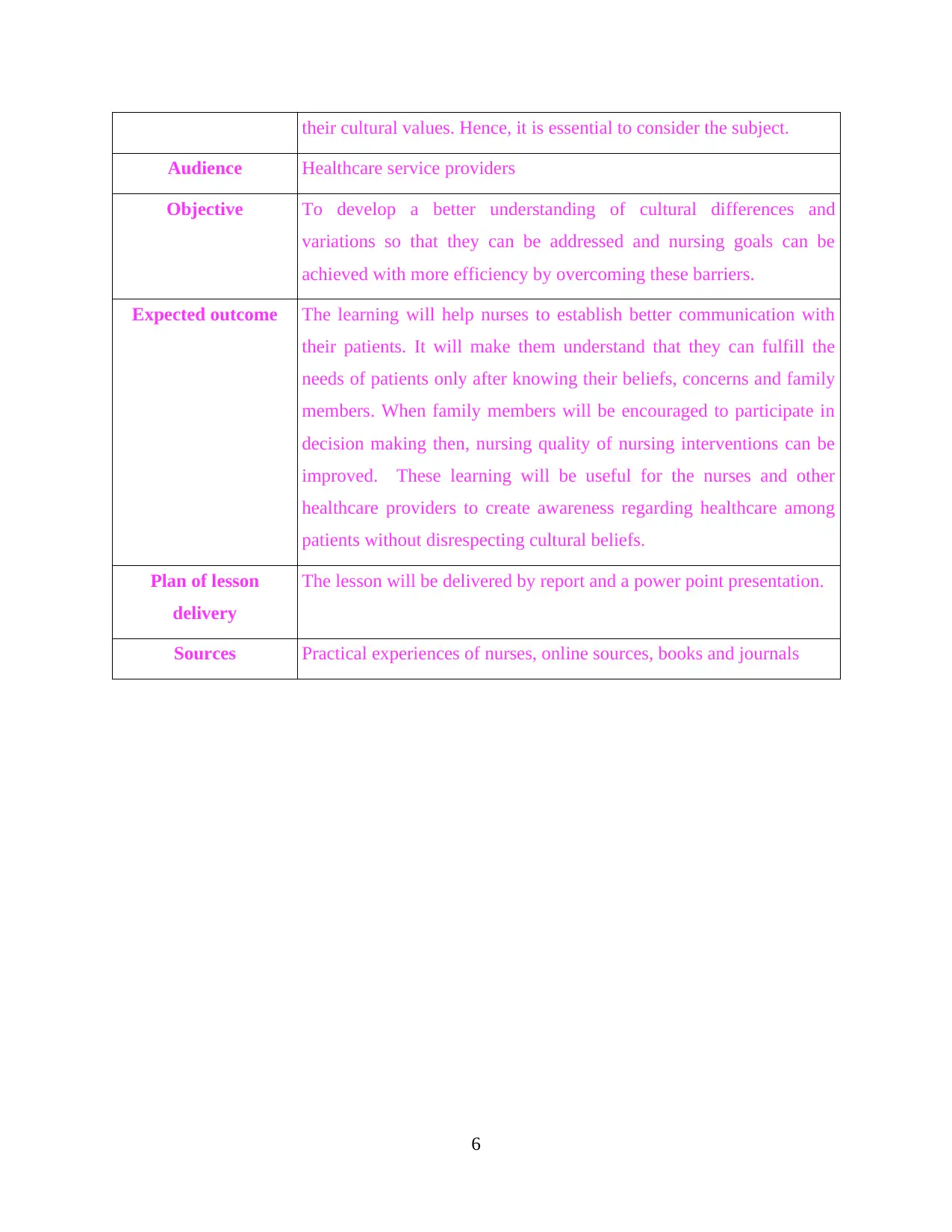
their cultural values. Hence, it is essential to consider the subject.
Audience Healthcare service providers
Objective To develop a better understanding of cultural differences and
variations so that they can be addressed and nursing goals can be
achieved with more efficiency by overcoming these barriers.
Expected outcome The learning will help nurses to establish better communication with
their patients. It will make them understand that they can fulfill the
needs of patients only after knowing their beliefs, concerns and family
members. When family members will be encouraged to participate in
decision making then, nursing quality of nursing interventions can be
improved. These learning will be useful for the nurses and other
healthcare providers to create awareness regarding healthcare among
patients without disrespecting cultural beliefs.
Plan of lesson
delivery
The lesson will be delivered by report and a power point presentation.
Sources Practical experiences of nurses, online sources, books and journals
6
Audience Healthcare service providers
Objective To develop a better understanding of cultural differences and
variations so that they can be addressed and nursing goals can be
achieved with more efficiency by overcoming these barriers.
Expected outcome The learning will help nurses to establish better communication with
their patients. It will make them understand that they can fulfill the
needs of patients only after knowing their beliefs, concerns and family
members. When family members will be encouraged to participate in
decision making then, nursing quality of nursing interventions can be
improved. These learning will be useful for the nurses and other
healthcare providers to create awareness regarding healthcare among
patients without disrespecting cultural beliefs.
Plan of lesson
delivery
The lesson will be delivered by report and a power point presentation.
Sources Practical experiences of nurses, online sources, books and journals
6
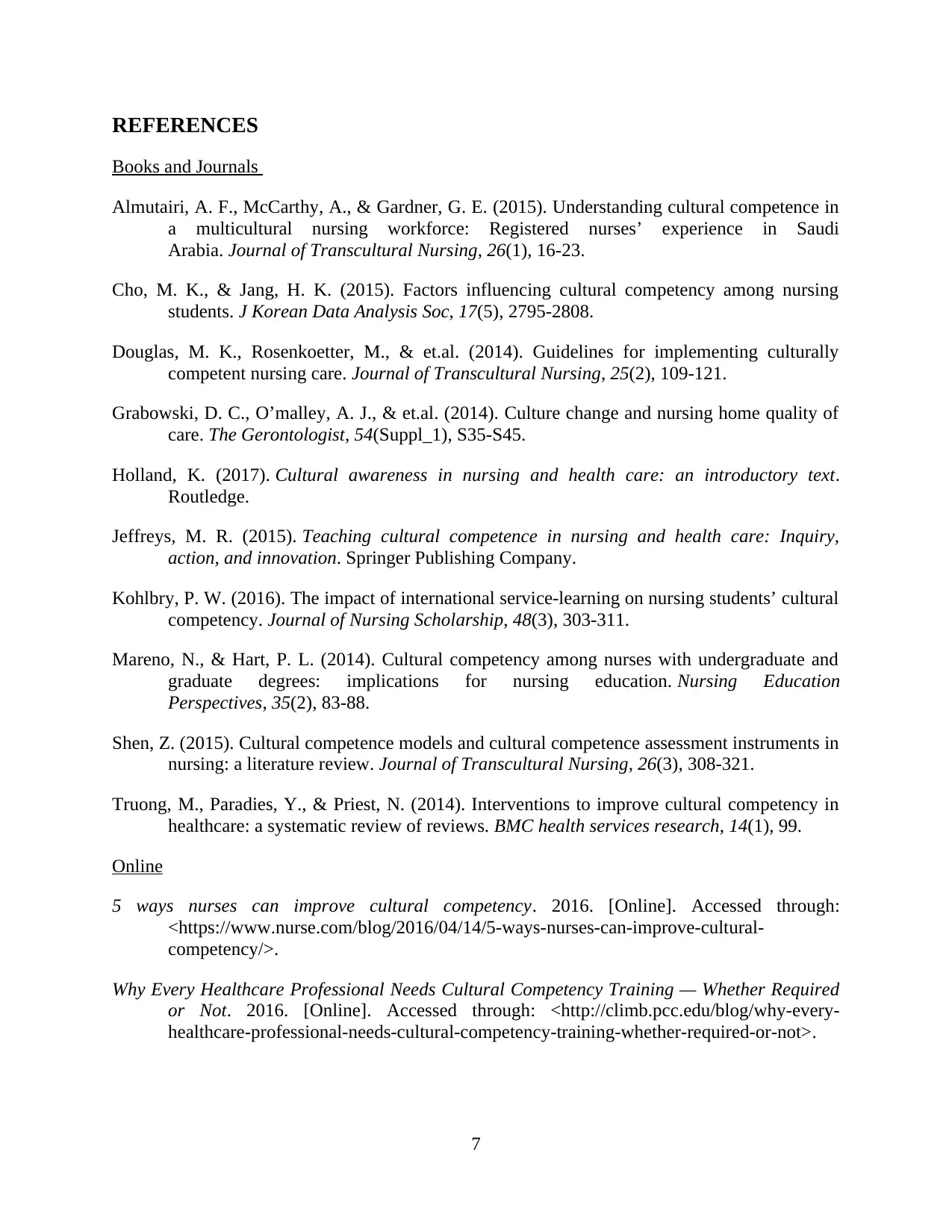
REFERENCES
Books and Journals
Almutairi, A. F., McCarthy, A., & Gardner, G. E. (2015). Understanding cultural competence in
a multicultural nursing workforce: Registered nurses’ experience in Saudi
Arabia. Journal of Transcultural Nursing, 26(1), 16-23.
Cho, M. K., & Jang, H. K. (2015). Factors influencing cultural competency among nursing
students. J Korean Data Analysis Soc, 17(5), 2795-2808.
Douglas, M. K., Rosenkoetter, M., & et.al. (2014). Guidelines for implementing culturally
competent nursing care. Journal of Transcultural Nursing, 25(2), 109-121.
Grabowski, D. C., O’malley, A. J., & et.al. (2014). Culture change and nursing home quality of
care. The Gerontologist, 54(Suppl_1), S35-S45.
Holland, K. (2017). Cultural awareness in nursing and health care: an introductory text.
Routledge.
Jeffreys, M. R. (2015). Teaching cultural competence in nursing and health care: Inquiry,
action, and innovation. Springer Publishing Company.
Kohlbry, P. W. (2016). The impact of international service‐learning on nursing students’ cultural
competency. Journal of Nursing Scholarship, 48(3), 303-311.
Mareno, N., & Hart, P. L. (2014). Cultural competency among nurses with undergraduate and
graduate degrees: implications for nursing education. Nursing Education
Perspectives, 35(2), 83-88.
Shen, Z. (2015). Cultural competence models and cultural competence assessment instruments in
nursing: a literature review. Journal of Transcultural Nursing, 26(3), 308-321.
Truong, M., Paradies, Y., & Priest, N. (2014). Interventions to improve cultural competency in
healthcare: a systematic review of reviews. BMC health services research, 14(1), 99.
Online
5 ways nurses can improve cultural competency. 2016. [Online]. Accessed through:
<https://www.nurse.com/blog/2016/04/14/5-ways-nurses-can-improve-cultural-
competency/>.
Why Every Healthcare Professional Needs Cultural Competency Training — Whether Required
or Not. 2016. [Online]. Accessed through: <http://climb.pcc.edu/blog/why-every-
healthcare-professional-needs-cultural-competency-training-whether-required-or-not>.
7
Books and Journals
Almutairi, A. F., McCarthy, A., & Gardner, G. E. (2015). Understanding cultural competence in
a multicultural nursing workforce: Registered nurses’ experience in Saudi
Arabia. Journal of Transcultural Nursing, 26(1), 16-23.
Cho, M. K., & Jang, H. K. (2015). Factors influencing cultural competency among nursing
students. J Korean Data Analysis Soc, 17(5), 2795-2808.
Douglas, M. K., Rosenkoetter, M., & et.al. (2014). Guidelines for implementing culturally
competent nursing care. Journal of Transcultural Nursing, 25(2), 109-121.
Grabowski, D. C., O’malley, A. J., & et.al. (2014). Culture change and nursing home quality of
care. The Gerontologist, 54(Suppl_1), S35-S45.
Holland, K. (2017). Cultural awareness in nursing and health care: an introductory text.
Routledge.
Jeffreys, M. R. (2015). Teaching cultural competence in nursing and health care: Inquiry,
action, and innovation. Springer Publishing Company.
Kohlbry, P. W. (2016). The impact of international service‐learning on nursing students’ cultural
competency. Journal of Nursing Scholarship, 48(3), 303-311.
Mareno, N., & Hart, P. L. (2014). Cultural competency among nurses with undergraduate and
graduate degrees: implications for nursing education. Nursing Education
Perspectives, 35(2), 83-88.
Shen, Z. (2015). Cultural competence models and cultural competence assessment instruments in
nursing: a literature review. Journal of Transcultural Nursing, 26(3), 308-321.
Truong, M., Paradies, Y., & Priest, N. (2014). Interventions to improve cultural competency in
healthcare: a systematic review of reviews. BMC health services research, 14(1), 99.
Online
5 ways nurses can improve cultural competency. 2016. [Online]. Accessed through:
<https://www.nurse.com/blog/2016/04/14/5-ways-nurses-can-improve-cultural-
competency/>.
Why Every Healthcare Professional Needs Cultural Competency Training — Whether Required
or Not. 2016. [Online]. Accessed through: <http://climb.pcc.edu/blog/why-every-
healthcare-professional-needs-cultural-competency-training-whether-required-or-not>.
7

APPENDIX
8
8
Paraphrase This Document
Need a fresh take? Get an instant paraphrase of this document with our AI Paraphraser
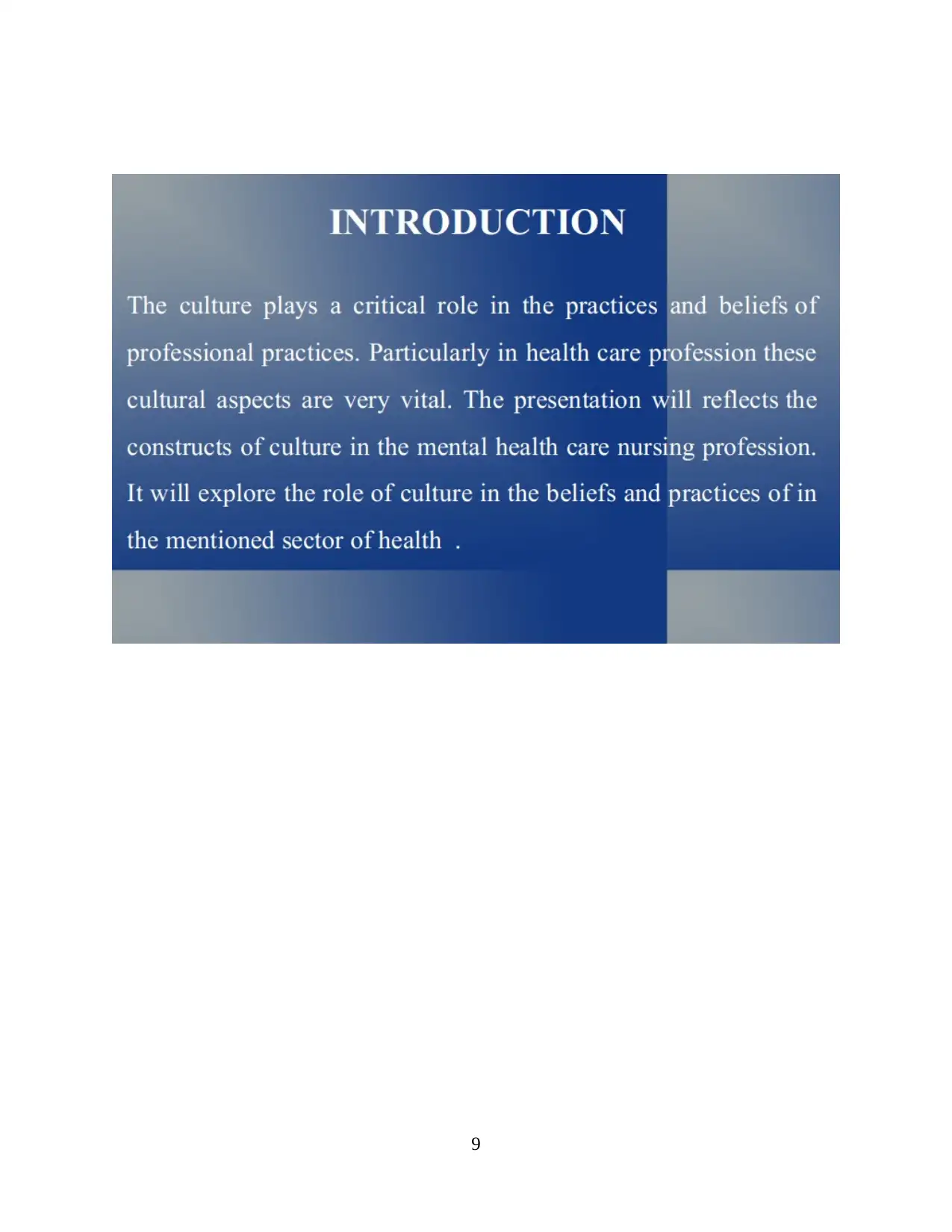
9
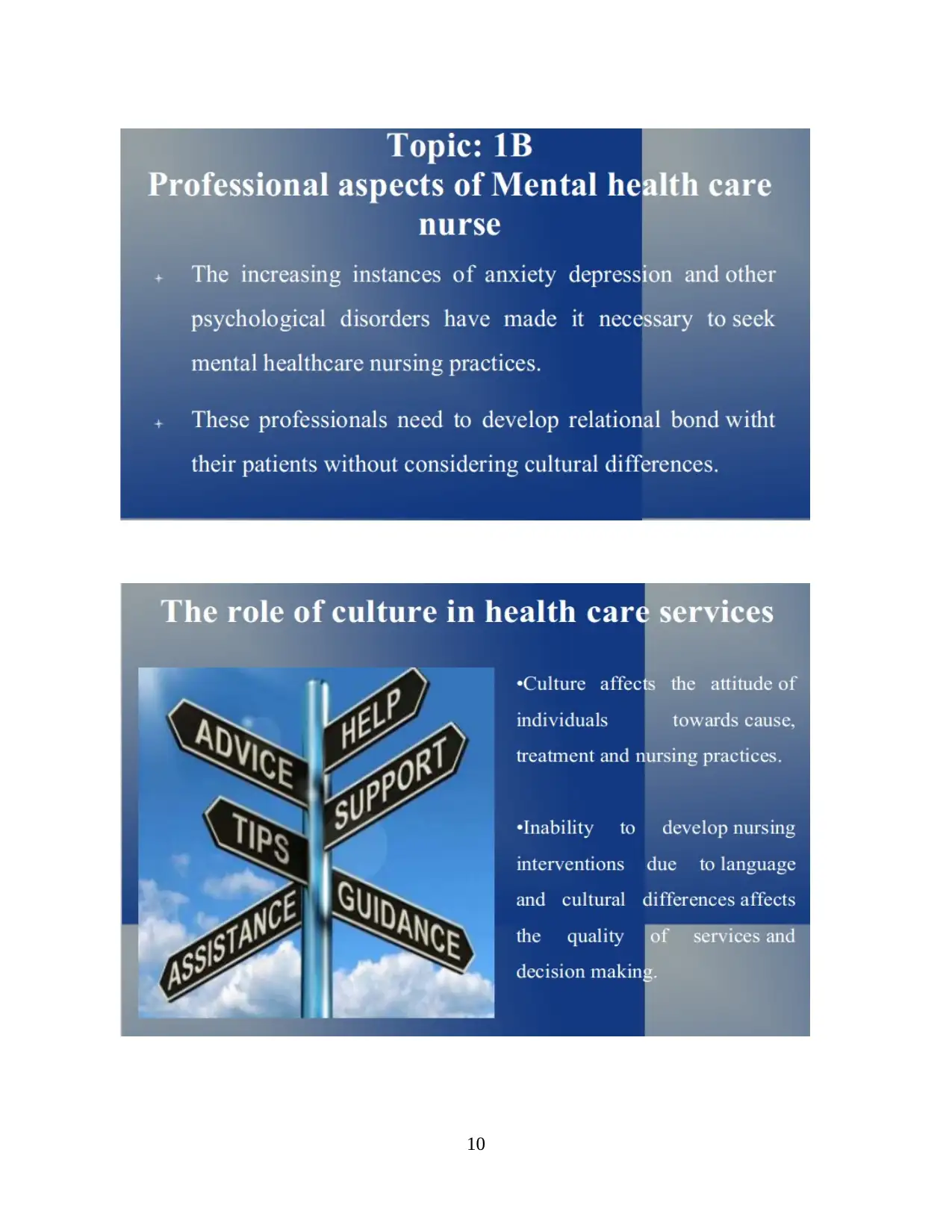
10
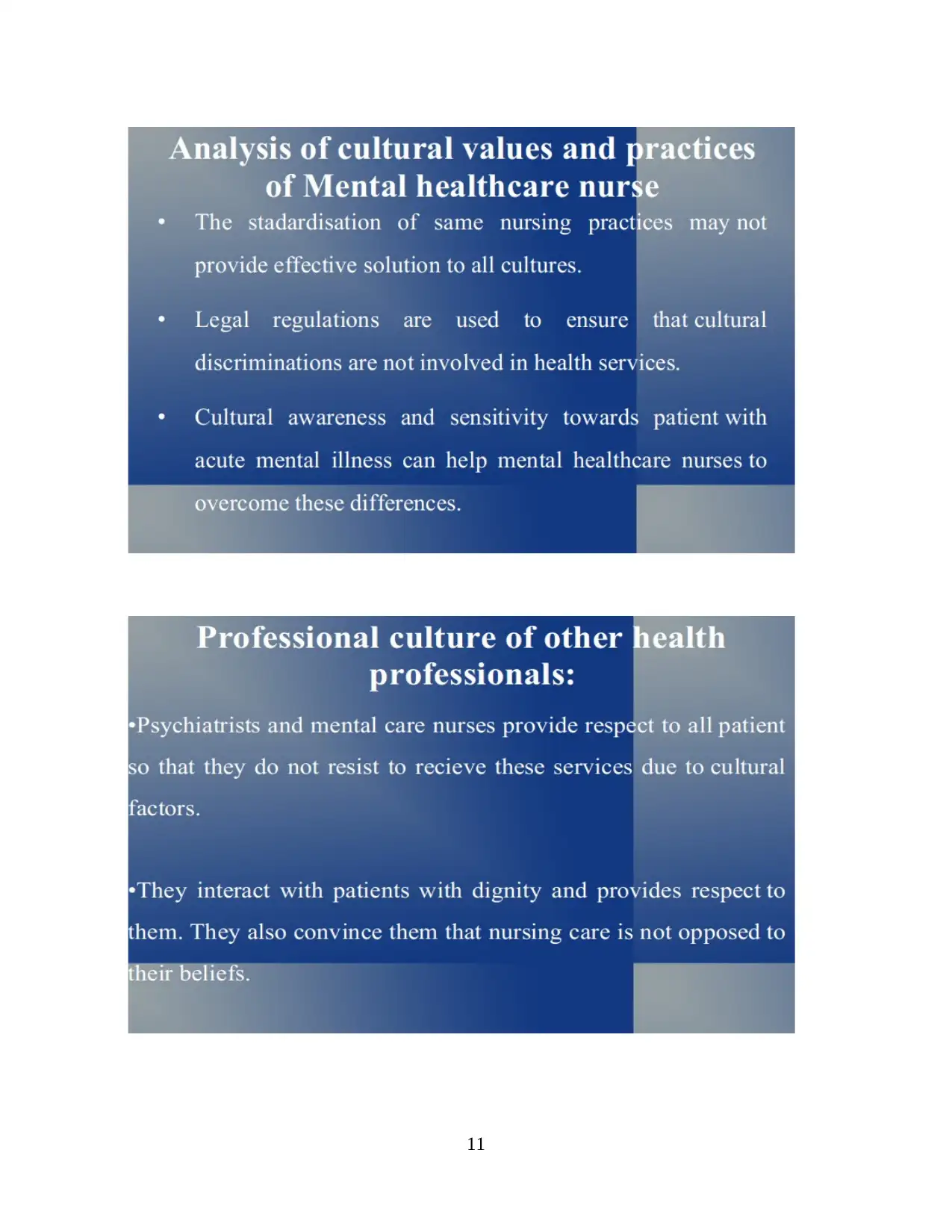
11
Secure Best Marks with AI Grader
Need help grading? Try our AI Grader for instant feedback on your assignments.
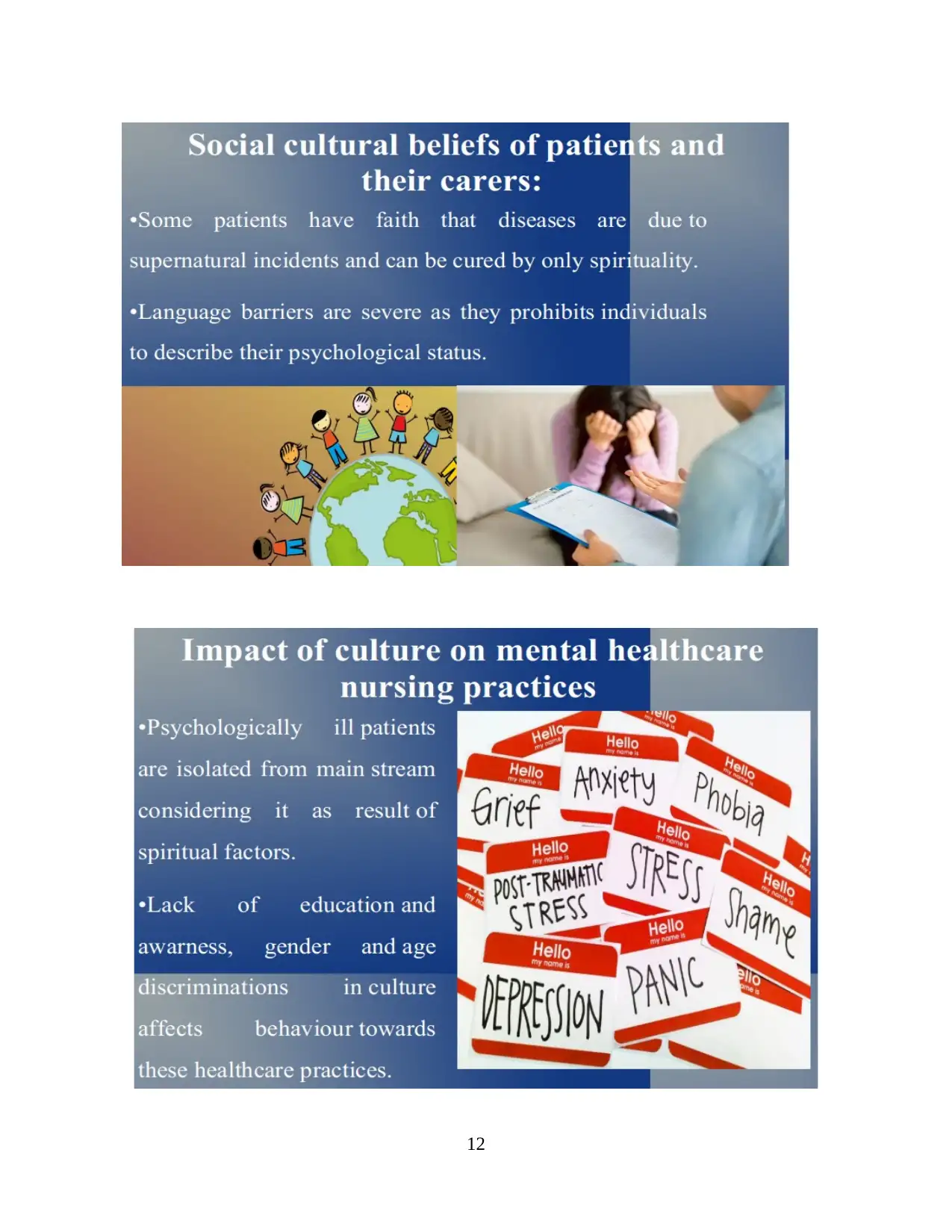
12
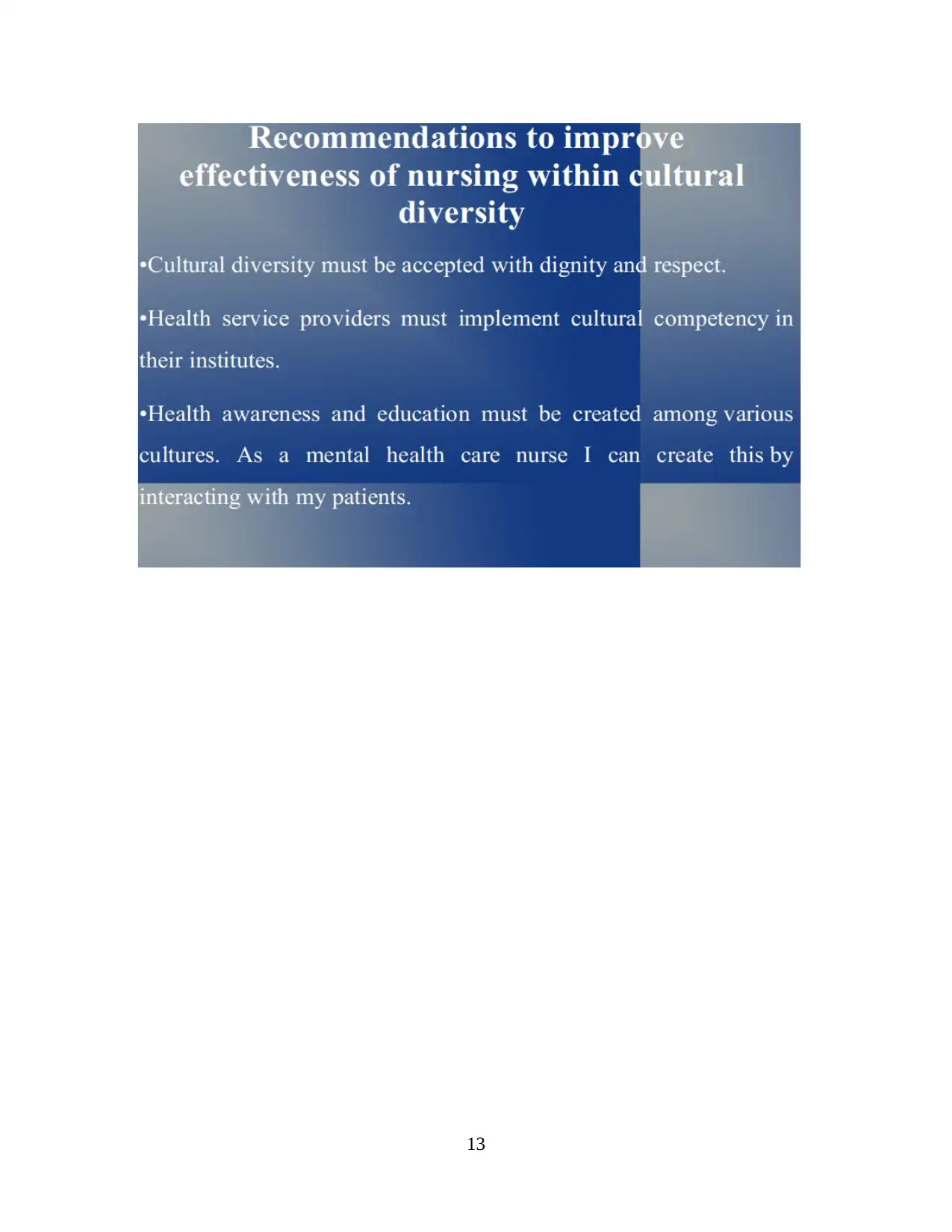
13
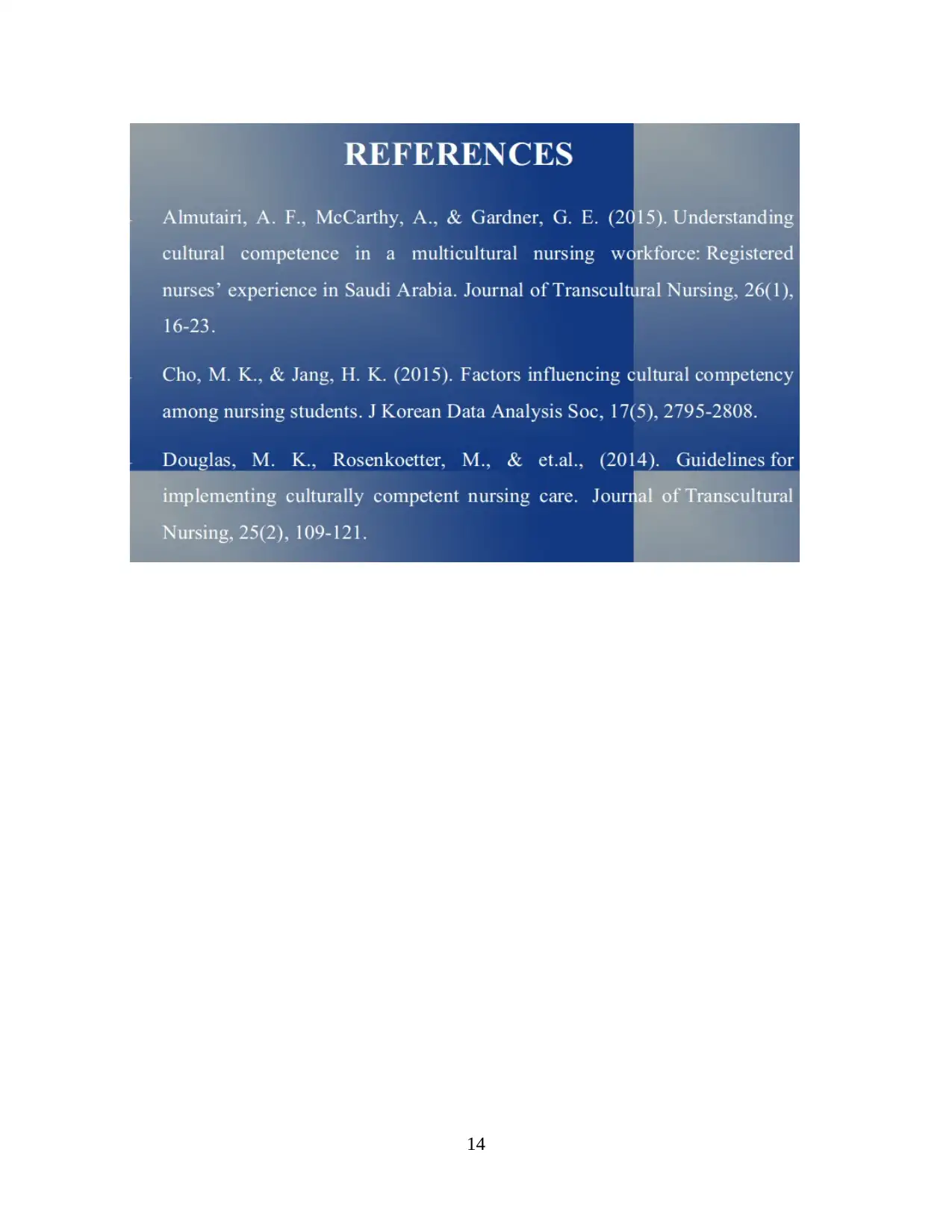
14
1 out of 16
Related Documents
Your All-in-One AI-Powered Toolkit for Academic Success.
+13062052269
info@desklib.com
Available 24*7 on WhatsApp / Email
![[object Object]](/_next/static/media/star-bottom.7253800d.svg)
Unlock your academic potential
© 2024 | Zucol Services PVT LTD | All rights reserved.





